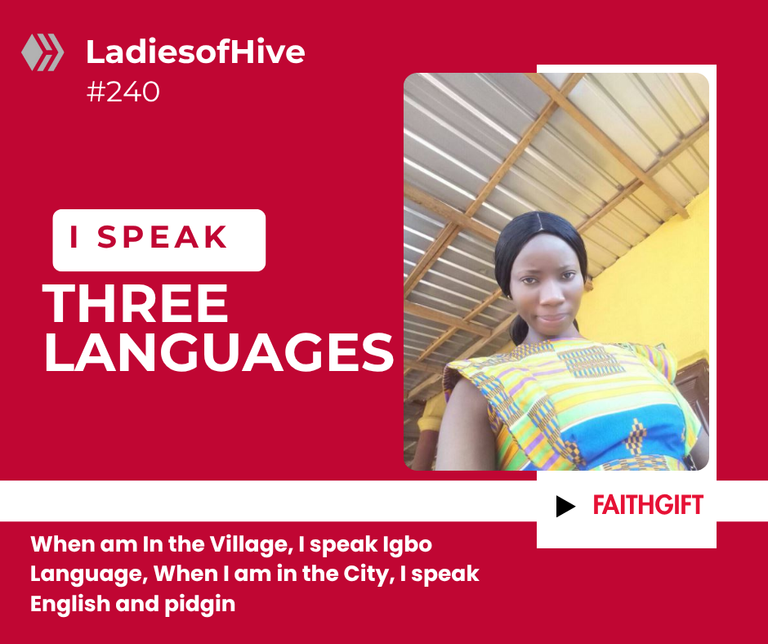I Speak Three Languages #240

Happy new month to all the beautiful ladies of Hive!
I wish you more happiness and peace in everything you do. It’s a pleasure to join this week’s contest, which is all about how versatile we are in speaking different languages.
For me, the way I communicate with people often depends on the environment I find myself in. For example, when I travel to the village to visit my grandmother, I avoid speaking English with her. It’s not because she doesn’t understand English , she actually does but she’s more fluent and comfortable speaking Igbo. So, I speak Igbo with her too, and I do it very well. In fact, in my state, it’s rare to find someone who doesn’t speak the Igbo language.
It’s part of our culture, and I’m proud to be able to speak it fluently. In fact, in every corner and cranny you enter, you’ll definitely come across people who speak Igbo especially in the interior villages. People may even look at you strangely if you speak more English than Igbo in my state. It’s not that we don’t have English speakers, but in most interior communities, the mother tongue is the main language used for communication in my village.

It’s spoken almost everywhere you go. Even in educational institutions, some lecturers still teach and communicate using the native language, especially when they want students to understand better. That being said, I’m also fluent in English. As the Bible says, when you go to Rome, behave like the Romans and the same applies when you're in Greece. So, when I’m in the city, I speak English. I’m very fluent in it and use it often, especially in formal settings.

In offices, it’s expected that we use English as the official language for communication because you'll definitely meet people from different ethnic backgrounds. For example, my boss is from the North while I’m from the East. The best and most effective way to communicate with him is in English. Aside from English and Igbo, there’s another language I speak fluently ,the vernacular we commonly call Pidgin English in Nigeria. Almost everyone knows how to speak it, even though it’s not taught in schools.
It’s a self-learned language, picked up naturally through conversation and environment. Interestingly, I learned most of these languages at home, especially from the house help who was sent to take care of us when I was younger. She came from the village and wasn’t fluent in English. At first, it was hard to communicate with her, especially as kids. But over time, because my parents were often busy with work and weren’t always around to help with cooking or chores, we had to depend on her. Gradually, we picked up her language and that’s how I became fluent in both Igbo and Pidgin.
She only spoke Igbo to us, and that’s how I gradually learned the language. My parents also communicated with us in Igbo at home, which helped me become more fluent as I grew.
Thank you for reading up to this point. I just wanted to let you all know that I’m fluent in three languages: Igbo, which is my mother tongue, English, which I learned while growing up, and Pidgin English, which I picked up naturally from my environment.
Thanks again for reading! Until I come your way again, stay blessed

View or trade
LOHtokens.@faithgifty34, You have received 1.0000 LOH for posting to Ladies of Hive.
We believe that you should be rewarded for the time and effort spent in creating articles. The goal is to encourage token holders to accumulate and hodl LOH tokens over a long period of time.
Your post has been curated and upvoted by Ecency!
Stay on track and keep up the good work!
Join us on the Ecency Discord
!LADY
View or trade
LOHtokens.@hive-124452, you successfully shared 0.1000 LOH with @faithgifty34 and you earned 0.1000 LOH as tips. (16/50 calls)
Use !LADY command to share LOH! More details available in this post.